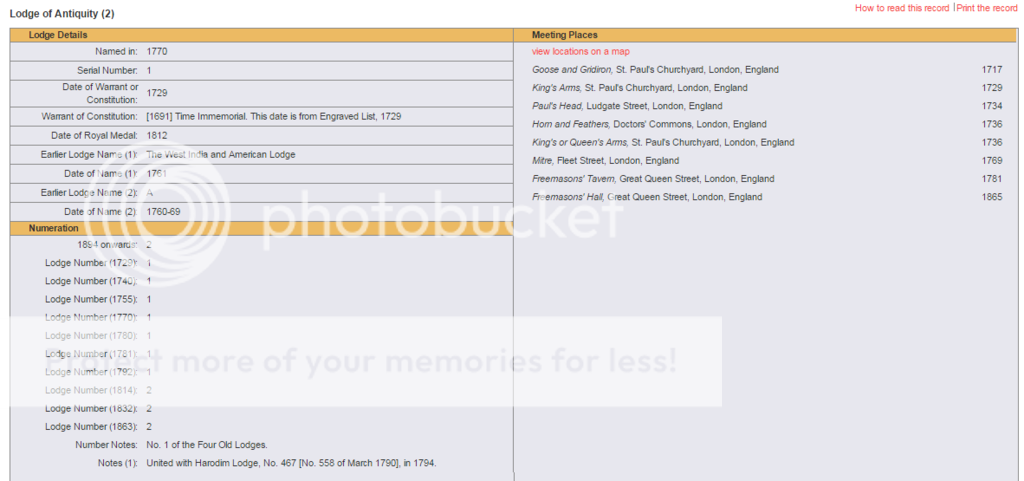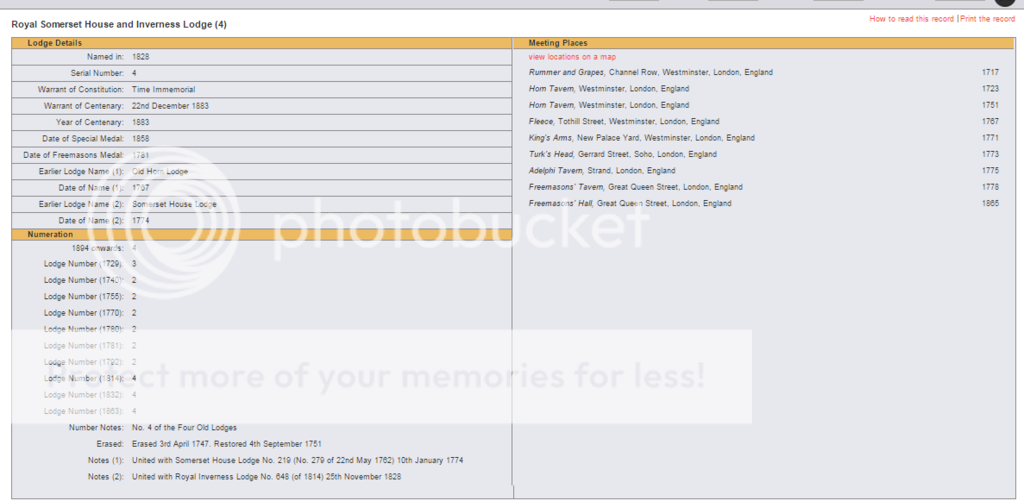When talking about the warrants of lodge, I visited a very historical lodge last Monday and their lodge warrant is just like the things that we can see in the museum, very oldish but prestigious. The warrant is issued by the Grand Lodge of England in 1777. This is quite shocked for me to see it because normally I only see some "modern"(20th Century) warrants.
My Freemasonry | Freemason Information and Discussion Forum
You are using an out of date browser. It may not display this or other websites correctly.
You should upgrade or use an alternative browser.
You should upgrade or use an alternative browser.
Irregular lodge?
- Thread starter Triclocarbon
- Start date
The Indefatigable Lodge No.237, now under the jurisdiction of UGLE, the oldest lodge in my province.What Lodge?
Would like to have a share again.In general regular grand lodges don't have charters or warrants as such. Their founding member lodges had charters from parent jurisdictions that they turned in. What regular jurisdictions have is historical lineage since turned in plus recognition. The fact that a jurisdiction shows its warrant is suspicious in and of itself.
I visited a Masonic Hall in South West England and one of those lodges is under the UGLE jurisdiction. However they don't have a warrant or charter on it as they existed even longer than the Grand Lodge of England.
Psalm 133
Registered User
It is not on the locator. Is there a law. Like copyright infringement or something that prevents such things. the lodge operates under strict guidelines the same guidelines I've read about that make a lodge legit-emit, but of course with it not being on the GLOT locator. Well enough said. Can a lodge practice masonry, but not be accepted among all brothers? If someone becomes a mason there are they really a mason?
Nobody owns a trademark or copyright on the square and compasses or on Masonic ritual. Someone could create "The Most Worshipful Grand Lodge of Thunder" in their garage and there's nothing anyone could do about it. But, with only a few exceptions these clandestine groups tend to extinguish themselves pretty quickly due to mismanagement.
However, there are groups like the Grand Orient de France which is very similar to the Masonry that you and I practice, but with some key differences that prevent intervisitation. Personally I consider them to be practicing Masonry, even if I would not be able to communicate Masonically or sit in lodge with them. It's just a different sort of Masonry. This is to be distinguished from the exploitative character of most clandestine lodges, which tend to charge insane dues and engage in violent hazing.
Which Lodge?Would like to have a share again.
I visited a Masonic Hall in South West England and one of those lodges is under the UGLE jurisdiction. However they don't have a warrant or charter on it as they existed even longer than the Grand Lodge of England.
Forgot need to find it back.Which Lodge?
LAMason
Premium Member
I do not claim to be an expert on the UGLE or its history, but as I understand it, the only UGLE Lodges that could operate without a warrant would be the four time immemorial lodges that formed the Premier Grand Lodge of England/Grand Lodge of London and Westminster/Grand Lodge of England. Of those 3 are still in existence. Hopefully some of our UGLE members will correct me if I am wrong.
“Goose and Gridiron Ale-house in St. Paul's Church-yard (Lodge now called Lodge of Antiquity No. 2); the Crown Ale-house in Parker's Lane off Drury Lane; theApple-Tree Tavern in Charles Street, Covent Garden (Lodge now called Lodge of Fortitude and Old Cumberland No. 12); and theRummer and Grapes Tavern in Channel Row, Westminster (Lodge now called Royal Somerset House and Inverness Lodge No. IV).”
http://self.gutenberg.org/articles/Premier_Grand_Lodge_of_England



http://www.freemasonry.london.museum/resources/lanes-masonic-records/
“Goose and Gridiron Ale-house in St. Paul's Church-yard (Lodge now called Lodge of Antiquity No. 2); the Crown Ale-house in Parker's Lane off Drury Lane; theApple-Tree Tavern in Charles Street, Covent Garden (Lodge now called Lodge of Fortitude and Old Cumberland No. 12); and theRummer and Grapes Tavern in Channel Row, Westminster (Lodge now called Royal Somerset House and Inverness Lodge No. IV).”
http://self.gutenberg.org/articles/Premier_Grand_Lodge_of_England



http://www.freemasonry.london.museum/resources/lanes-masonic-records/
Rifleman1776
Registered User
Your basic question is simple to answer. Call the Grand Secretary of the GL of Texas and ask.There is a lodge practicing in Dallas.
The name of the lodge is Jeremiah grand lodge AF&AM. The GM is T. Hadnot. I would like to find out the legitimacy of this lodge; if any.
The lodge is of Ancient Accepted Scottish Rite masons. So claims. How can I find out if this is a legitimate lodge? Can a lodge claim to practice masonry but not be real? If someone becomes a mason there are they really a mason?
Warrior1256
Site Benefactor
Very simple solution.Your basic question is simple to answer. Call the Grand Secretary of the GL of Texas and ask.